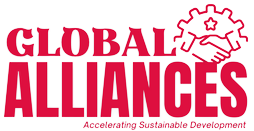
Collaborating with Government Agencies for Business Growth and Regulatory Compliance
Collaborating with government agencies can provide businesses with access to valuable resources, expertise, and funding. Government agencies are responsible for regulating various aspects of business operations and providing support for businesses to grow and thrive. We will explore the benefits of collaborating with government agencies for business growth and regulatory compliance and provide best practices for creating successful partnerships.
Collaborating with government agencies is essential for businesses to grow and comply with regulations. Government agencies have the power to regulate various aspects of business operations, including health and safety, labor practices, environmental protection, and taxation. By collaborating with government agencies, businesses can access resources, expertise, and funding to help them navigate these regulations and grow their operations.

The Benefits of Collaborating with Government Agencies
- Access to Funding: Government agencies often provide funding to businesses to support growth and innovation. This funding can come in the form of grants, loans, or tax incentives. By collaborating with government agencies, businesses can access these funding opportunities and leverage them to grow and innovate.
- Regulatory Compliance: Government agencies are responsible for enforcing regulations that impact businesses. By collaborating with government agencies, businesses can stay up-to-date on regulatory requirements and ensure compliance. This can help businesses avoid costly penalties and legal issues.
- Access to Expertise: Government agencies often have expertise in specific industries or areas of regulation. By collaborating with these agencies, businesses can access this expertise and gain valuable insights into how to comply with regulations and grow their operations.
- Network Building: Collaborating with government agencies can help businesses build their networks and establish relationships with key players in their industries. This can lead to new business opportunities and partnerships.
Related Post :
- The impact of cross-cultural partnerships on business success
- Leveraging partnerships for talent acquisition and development
- The Importance of Communication in Partnerships and Alliances

Best Practices for Collaborating with Government Agencies
- Identify Common Goals: To create successful partnerships with government agencies, businesses should identify common goals and objectives. This can involve identifying areas of regulation or funding opportunities that align with the business’s goals.
- Build Relationships: Collaborating with government agencies is all about building relationships. Businesses should invest time and resources in building relationships with key players in government agencies. This can involve attending industry conferences, participating in collaborative projects, and leveraging social media and other digital platforms.
- Be Transparent: When collaborating with government agencies, it is important to be transparent about the business’s operations and goals. This can help to build trust and establish a productive partnership. Businesses should disclose any potential conflicts of interest or other issues that may affect the partnership.
- Stay Up-to-Date: Regulations and funding opportunities are constantly changing. Businesses should stay up-to-date on changes in regulations and funding opportunities by regularly checking government websites and attending industry events. This can help businesses to stay ahead of the curve and take advantage of new opportunities.
- Communicate Effectively: Effective communication is essential for successful collaborations with government agencies. Businesses should establish clear communication channels and ensure that all parties are kept informed and up-to-date. This can involve regular meetings, status reports, and other forms of communication.
- Manage Expectations: When collaborating with government agencies, it is important to manage expectations. Businesses should be realistic about what they can achieve and communicate their limitations clearly. This can help to avoid misunderstandings and ensure that the partnership remains productive and beneficial for all parties.
- Seek Legal Advice: Collaborating with government agencies can involve complex legal issues. Businesses should seek legal advice to ensure that they understand their rights and obligations and are complying with all relevant laws and regulations.
- Seek Feedback: Government agencies can provide valuable feedback and insights into the business’s operations and compliance with regulations. Businesses should seek feedback from government agencies to identify areas for improvement and opportunities for growth.

The Importance of Collaborating with Government Agencies
Collaborating with government agencies can provide businesses with access to valuable resources, expertise, and funding. By collaborating with government agencies, businesses can access funding opportunities, ensure regulatory compliance, access expertise, and build networks. To create successful partnerships with government agencies, businesses should identify common goals, build relationships, be transparent, stay up-to-date, and seek feedback.
Successful examples of collaborations with government agencies include the Small Business Administration and the Environmental Protection Agency. These agencies provide support and resources to businesses focused on growth and regulatory compliance.
Collaborating with government agencies is essential for businesses to grow and comply with regulations. Government agencies offer a range of resources, funding opportunities, and expertise that can help businesses navigate complex regulations and grow their operations. By following best practices and seeking out collaborations with government agencies, businesses can position themselves for success in today’s dynamic and competitive business landscape.
















